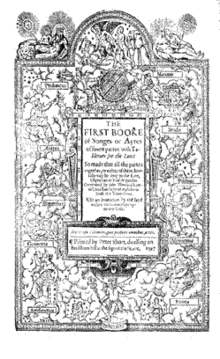
John Dowland was an English Renaissance composer, lutenist, and singer. He is best known today for his melancholy songs such as "Come, heavy sleep", "Come again", "Flow my tears", "I saw my Lady weepe", "Now o now I needs must part", and "In darkness let me dwell". His instrumental music has undergone a major revival, and with the 20th century's early music revival, has been a continuing source of repertoire for lutenists and classical guitarists.
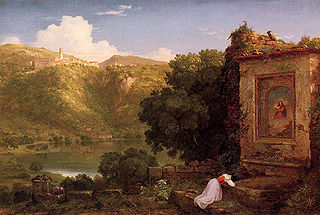
Il Penseroso is a poem by John Milton, first found in the 1645/1646 quarto of verses The Poems of Mr. John Milton, both English and Latin, published by Humphrey Moseley. It was presented as a companion piece to L'Allegro, a vision of poetic mirth. The speaker of this reflective ode dispels "vain deluding Joys" from his mind in a ten-line prelude, before invoking "divinest Melancholy" to inspire his future verses. The melancholic mood is idealised by the speaker as a means by which to "attain / To something like prophetic strain," and for the central action of Il Penseroso – which, like L'Allegro, proceeds in couplets of iambic tetrameter – the speaker speculates about the poetic inspiration that would transpire if the imagined goddess of Melancholy he invokes were his Muse. The highly digressive style Milton employs in L'Allegro and Il Penseroso dually precludes any summary of the poems' dramatic action as it renders them interpretively ambiguous to critics. However, it can surely be said that the vision of poetic inspiration offered by the speaker of Il Penseroso is an allegorical exploration of a contemplative paradigm of poetic genre.

A Christian child's prayer is Christian prayer recited primarily by children that is typically short, rhyming, or has a memorable tune. It is usually said before bedtime, to give thanks for a meal, or as a nursery rhyme. Many of these prayers are either quotes from the Bible, or set traditional texts.
John Bennet was a composer of the English Madrigal School. Little is known for certain of Bennet's life, but his first collection of madrigals was published in 1599.

Feste is a fictional character in William Shakespeare's comedy Twelfth Night. He is a fool attached to the household of the Countess Olivia. He has apparently been there for some time, as he was a "fool that the Lady Olivia's father took much delight in" (2.4). Although Olivia's father has died within the last year, it is possible that Feste approaches or has reached middle age, though he still has the wit to carry off good 'fooling' when he needs to, and the voice to sing lustily or mournfully as the occasion demands. He is referred to by name only once during the play, in answer to an inquiry by Orsino of who sang a song that he heard the previous evening. Curio responds "Feste, the jester, my lord; a fool that the lady Olivia's father took much delight in. He is about the house" (2.4). Throughout the rest of the play, he is addressed only as "Fool," while in the stage directions he is mentioned as "Clown."
"I Saw My Lady Weep" is a lute song from The Second Book of Songs by Renaissance lutenist and composer John Dowland. It is the first song in the Second Book and is dedicated to Anthony Holborne. It is an example of Dowland's use of chromaticism.
William Shakespeare's play Hamlet has contributed many phrases to common English, from the famous "To be, or not to be" to a few less known, but still in everyday English.
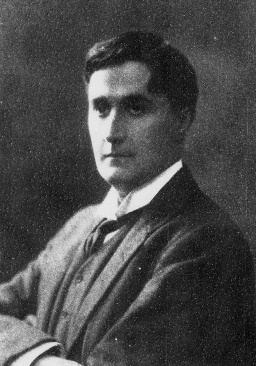
The Five Mystical Songs are a musical composition by English composer Ralph Vaughan Williams (1872–1958), written between 1906 and 1911. The work sets four poems by seventeenth-century Welsh poet and Anglican priest George Herbert (1593–1633), from his 1633 collection The Temple: Sacred Poems. While Herbert was a priest, Vaughan Williams himself was an atheist at the time, though this did not prevent his setting of verse of an overtly religious inspiration. The work received its first performance on 14 September 1911, at the Three Choirs Festival in Worcester, with Vaughan Williams conducting.
The Second Book of Songs is a book of songs composed by Renaissance composer John Dowland and published in London in 1600. He dedicated it to Lucy Russell, Countess of Bedford.
When The Nightingale Sings is a Middle English poem, author unknown, recorded in the British Library's Harley 2253 manuscript, verse 25. It is a love poem, extolling the beauty and lost love of an unknown maiden.
"In darkness let me dwell" is a song ascribed to the lutenist and composer John Dowland. Published in 1610, late in Dowland's career, the song shows the influence of Italian music of the early baroque. It was published as song no. 10 in A Musical Banquet, a 1610 anthology of songs for lute and voice from England, France, Italy, and Spain compiled by Robert Dowland, John's son. "In darkness let me dwell" has been recorded by many artists, notably by on the 2006 album Songs from the Labyrinth by Sting with Edin Karamazov.
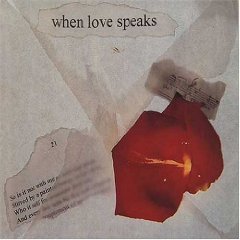
When Love Speaks is a compilation album that features interpretations of William Shakespeare's sonnets – some spoken, some set to music – and excerpts from his plays by famous actors and musicians, released under EMI Classics in April 2002. The original idea came from Joy Gelardi who proposed the album as a fund raiser for Shakespeare’s Globe Theatre. When that plan fell through, Joy and Michael Kamen, together with Alan Rickman, co-produced it in support of RADA. Alan chose the title, which alludes to a speech in Love's Labour's Lost – "And when love speaks, the voice of all the gods make heaven drowsy with the harmony." – which is, however, not on the album.
Now o Now I Needs Must Part is a song by the sixteenth-seventeenth-century composer John Dowland. The lyrics, a bittersweet contemplation of love and loss, are anonymous. The song was first published in Dowland's collection First Booke of Songes or Ayres of foure partes with Tableture for the Lute (1597).
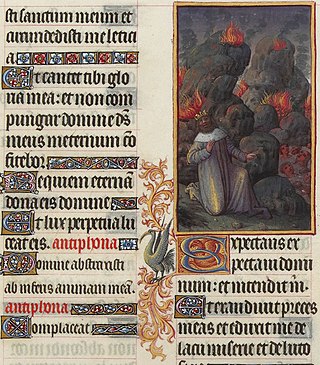
Psalm 40 is the 40th psalm of the Book of Psalms, beginning in English in the King James Version: "I waited patiently for the LORD". The Book of Psalms is part of the third section of the Hebrew Bible, and a book of the Christian Old Testament. In the slightly different numbering system used in the Greek Septuagint and Latin Vulgate translations of the Bible, this psalm is Psalm 39. In Latin, it is known by the incipit, "Expectans expectavi Dominum". It is described by the Jerusalem Bible as a "song of praise and prayer for help".

"Geh aus, mein Herz, und suche Freud" is a summer hymn with a text in German by the theologian Paul Gerhardt, written in 1653. It was first published in the same year in the fifth edition of Johann Crüger's hymnal, Praxis pietatis melica. The hymn was sung to several melodies, with the most popular one composed by August Harder. Later, it became a Volkslied in an abridged version.
"Contemplations" is a 17th-century poem by English colonist Anne Bradstreet. The poem's meaning is debated, with some scholars arguing that it is a Puritan religious poem while others argue that it is a Romantic poem.
"Robin Adair" is a traditional Irish song with lyrics written by Lady Caroline Keppel. It was popular in the 18th century. It has a Roud Folk Song Index number of 8918. The song was mentioned by Jane Austen in her 1815 novel Emma; the character Jane Fairfax played it on the piano. The song is also mentioned in Chapter IX of MacKinlay Kantor's Pulitzer Prize-winning novel "Andersonville" (1955).

The First Book of Songs is a collection of songs by John Dowland which includes one instrumental piece. The book was published in London in 1597 and was reprinted four times during the composer's lifetime.
